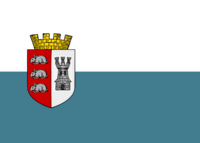Ciloven Accord
This article is incomplete because it is pending further input from participants, or it is a work-in-progress by one author. Please comment on this article's talk page to share your input, comments and questions. Note: To contribute to this article, you may need to seek help from the author(s) of this page. |
The Ciloven Accord (Trjebian: Ghilobhen Uņobh or Kilopene Unop) was an attempt international settlement negotiated in 1994 between the Republic of Alquiya and the Kingdom of Trjebia (also known as the Former Kingdom of Trjebia or FKT) to deal with the status of Trjebia and the Trjebian dispute. The accord was drafted at the Cloven Summit in Ciloven, Seketan, with the Seketese government acting as mediator. The agreement included a timeline on integrating the FKT and Southern Trjebia economically and diplomatically, as well as settling the naming dispute between the two.
Upon the agreements release it was met with large backlash from both countries. In Alquiya, the Southern Trjebian states of Lower Trjebia and Upper Trjebia protested the agreement due to its perception as an attempt to annex the staunchly republican territories into the royalist Kingdom. Some more radical local leaders like Sebastian Po and Michael Kam aquated the deal to a "cultural massacre" of Southern Trjebia's unique culture and way of life, and would eventually form the Trjebian Rights Association (TRA) as a Southern Trjebian rights party. In the 1995 election Prime Minister Markcus Revoloc, who had negotiated the agreement, lost re-election to the right wing NUAR, with the TRA winning virtually all the seats in Southern Trjebia. In the FKT the deal was met with more support, with negotiating Prime Minister Ricard Bhe successfully getting the legislature to ratify the agreement by a large margin and a plebiscite passing 55%-45%. However the royal family and King Henri IV, who still hold considerable power, refused to sign the accord due to its demotion of their titles and the recognition of the republican Southern Trjebia's as a distinct group.
The agreement would fail to get ratified by both nations and thus would never be fully enacted. The Southern Trjebian nationalism movement and the TRA would eventually form government in both Lower Trjebia and Upper Trjebia in 1995 and 1996 respectively. In the FKT, polarisation on the monarchies opposition to the agreement would lead to the rise of the pro-monarchist Thirteen Kingdoms Party and the republican Left-Green Alliance, along with the decline of Ricard Bhe's United Trjebia Society.
Background
Trjebians have inhabited the Nelborne for all of its written history and have been subject to multiple political entities. The principle medieval Trjebian nation state, historiographically known as the Old Kingdom of Trjebia, suffered several major defeats to neighbouring Nelbec kingdoms and became ultimately reduced to a rump state around Dremem which withstood further conquests. Lineage of the Trjebian monarch became disputed when Frederic II of Alquiya claimed the Trjebian throne in 1896.
Upon the collapse of the Nelbec Empire in 1919, Alquiya claimed that the Throne of Trjebia was disestablished, and that the current regime in the Dremem is not the Kingdom of Trjebia, but a new Trjebian state with an independent royal lineage started in 1986. The Alquiyan government also maintains the position that the country is a single nation state comprised of "multiple Nelbec and Trjebian tribes" and that Trjebians within their borders should be regarded as ethnic Alquiyans. Due to this, the Kingdom of Trjebia uses the neutral Former Kingdom of Trjebia (FKT) in international relations.
Prelude
Alquiya
Since the establishment of democracy in Alquiya in 1984, the right-wing nationalist National Union for Alquiyan Rejuvenation (NUAR) had won all elections with a stable majority as liberal opposition parties struggled to coalesce around a single ticket. The NUAR government continued the previous dictatorship's hardline position on Trjebian affairs and refused to recognize the Trjebian government. This all changed after the 1993 election, when Markcus Revoloc and his Democratic Centre Party won a surprise minority government over the NUAR and formed a government with the left-wing Social Compact Party.
One of Revoloc's most controversial campaign pieces was a promise to resolve the Trjebian dispute with the FKT as part of his plan to better integrate Alquiya into the international community. This made him deeply unpopular in Southern Trjebia and he won only a single seat in the region. Almost immediately his government reached out to the FKT government to schedule a bilateral conference. A pre-negotiation agreement, known as the Sjodjin Agreement, was signed on 13 November 1993, establishing relations between the two nations, though with Trjebian agreeing to be referred to the "Former Kingdom of Trjebia" or "F.K.T" temporarily in international affairs. Despite both parties agreeing for this arrangement to be temporary, it would prove to be the only lasting part of the broader negotiations.
Trjebia
Up until the 1980's Trjebia had been one of Europe's longest-lasting near-absolute monarchies, with the monarch wielding total control over the executive affairs of the kingdom. A system of local representatives, known as the Sjdhredhri, served as a de-facto legislature, though it was not fully democratically elected and was entirely subservient to the monarch. In 1930 a true parliament would be established, known as the Legislative Assembly, though it wouldn't be until a wave of pro-democracy movements and revolutions swept through the Nelborne in the 1980s that the Assembly and its leading Prime Minister would gain supremacy over the monarch is most matter.
By the 1990's a similar wave of liberalism brought liberal-aligned Ricard Bhe to the leadership of the powerful United Trjebia Society. The 1993 Trjebian general election returned a strong majority for Bhe, who had campaigned under a promise to "tie the Trebs together" with deals between Seketan and Alquiya. At the time, the King of Trjebia, Henri IV, was largely silent on the issue, though speculation regarding him refusing to sign any agreement with Alquiya was picked up by the news.


